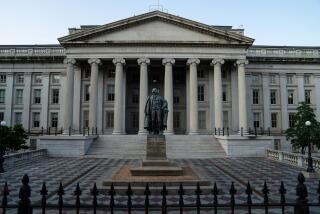Pension Agency Raises Expected Losses by $6 Billion : * Finances: The director of the federal fund that guarantees payments puts total probable obligations at $14 billion and says a worsening cash squeeze may force a taxpayer bailout.
- Share via
WASHINGTON — The director of the federal agency that guarantees pension funds announced Thursday a surprising jump of $6 billion in probable losses to the agency and warned that the situation is “deteriorating” because of severe weaknesses in the auto, steel and airline industries.
“We must make it harder for a company to have an under-funded pension plan,” James B. Lockhart, executive director of the Pension Benefit Guarantee Corp., told a task force of the House Budget Committee.
The agency, which protects retirement income for 40 million workers in 95,000 plans, faces a worsening cash squeeze that could force a taxpayer bailout in the 1990s.
If a company’s plan has insufficient money to make payments, the agency takes over the plan and issues the monthly retirement checks. The latest estimates show that the PBGC faces probable obligations of $14 billion to cover shortages in weak corporate pension plans, significantly greater than the agency’s prior estimate of $8 billion, Lockhart said.
“The exposure is concentrated in about 80 companies, primarily in the auto, steel and airline industries,” he said.
The fragile pension plans’ financial health has suffered recently from weak earnings on investments, combined with increases in the level of benefits, according to Lockhart. In 1991, the PBGC also absorbed the two biggest losses in its history, when it took control of the Pan Am pension plan, with a deficit of $900 million, and the Eastern program, with a shortage of $700 million.
As companies become weaker, they often skimp on contributions to their pension plans. A company can arbitrarily assume higher earnings on investments as a quick method to reduce contributions. Simply by changing a few numbers in this way, a troubled company can conserve its scarce cash.
In addition, companies with financial difficulties encourage workers to take early retirement, the PBGC chief said. “As conditions worsen, the company also may close plants and lay off employees, triggering special subsidized early-retirement benefits,” Lockhart told the task force hearing. “These higher early-retirement benefits are rarely, if ever, funded in advance.”
The PBGC’s financial worries were intensified recently when a federal judge ruled that a company in bankruptcy is not obligated to keep making payments into the corporate pension fund. As a result, the PBGC will have to pay the benefits for LTV Corp., a Dallas-based steel and aerospace firm that has filed for bankruptcy and has a pension plan that is under-funded by $1.6 billion.
The burdens on the PBGC “present an extremely serious threat to our insurance program and the $1-trillion defined-benefit pension system that we insure,” Lockhart said.
He called on Congress to change the bankruptcy laws to assure that when a company goes bankrupt it cannot avoid making contributions to its pension plan. “Companies and creditors would have less incentive to terminate under-funded plans if PBGC could recover significant amounts when plans terminate,” Lockhart said.
The PBGC has enough money now to meet its promise of paying up to $2,250 a month to retirees when pension funds suffer financial collapse and are seized by the government. The agency’s premium income collected from companies, $700 million this year, will exceed the $503 million paid to retirees.
In 1992, however, benefit spending will surpass income by more than $100 million, and the agency will make up the difference with earnings from its investments.
Sometime before the end of the decade, however, rising benefit payments will wipe out the agency’s assets, forcing a taxpayer bailout. Lockhart said financial reforms, including the bankruptcy law changes, could avert the need for a bailout.
More to Read
Inside the business of entertainment
The Wide Shot brings you news, analysis and insights on everything from streaming wars to production — and what it all means for the future.
You may occasionally receive promotional content from the Los Angeles Times.









